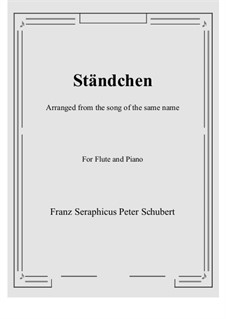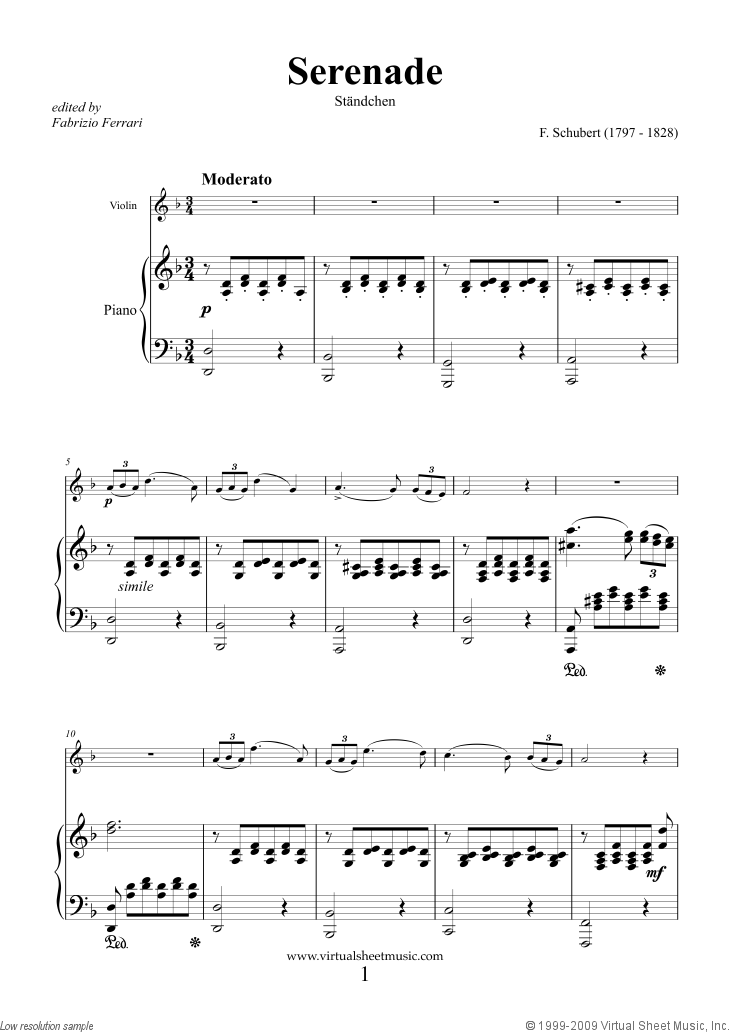
He wrote some six hundred romantic songs as well as many operas, symphonies, sonatas and many other works. Recorded in performance at the Marlboro Festival in Marlboro, Vermont in July. Benita Valente with Harold Wright, clarinet and Rudolph Serkin, piano.

Franz Peter Schubert (JanuNovember 19, 1828), was an Austrian composer. Ian Bostridge with Leif Ove Andsnes, piano. After this imaginative take on Schubert’s melody, Liszt returns to the provided coda and only in the final bars does he return to embellishing the original music, though still concludes in the same detached uneasiness. Subscribe to our channel to watch weekly Video Scores from our high quality sheet music About Franz Schubert Franz Peter Schubert (Janu November 19, 1828), was an Austrian composer. The result is one of Liszt’s remarkable coloristic effects-that of an eerie and distant echo. Franz Schubert’s Standchen Serenade sheet music for piano solo Video Score. Yet, this is not for the mere technical effect.

It is returned to its original pitch in the treble, but appears in canon an octave higher. The melody is at first presented in the treble, but on its second repetition is placed an octave lower and given the special indication “quasi Violoncello.” On the third and final appearance of the melody, Liszt gives an ingenious variation of it. Liszt, for the most part, remains true to Schubert’s original design. Schubert’s setting of the song is relatively simple with a broken chord accompaniment befitting of the serenade with only faint, momentary echoes of the vocal melody. The poet, here, sings passionately to his beloved, imploring her to join him and hoping that the “betrayer” has not turned her heart from him.

Seventh in the cycle of twelve songs, Ständchen: Leise flehen meine Lieder (Serenade: My Songs Beckon Softly) is based on a poem by Ludwig Rellstab. Stndchen (known in English by its first line Hark, hark, the lark or Serenade), D 889, is a lied for solo voice and piano by Franz Schubert. Today, Haslinger's ordering of the songs of Schwanengesang is regarded as the definitive version of the work.
SCHUBERT STANDCHEN PIANO FULL
alto voice solo (baritone voice), TTBB choir, piano Full score Lieder for choir, Secular choral music Composed by Franz Schubert (1797-1828). The origin of the songs as a cycle originated with the publisher, Tobias Haslinger, who gave the collection its title. Soft approaching, in the silence of the darkness (Standchen) Franz Schubert. 'Ständchen' ('Zögernd leise, in des Dunkels nächtger Hülle'), D 920/921, for alto solo, TTBB or SSAA chorus and piano, words by Franz Grillparzer.

Also known as 'Ruhe', and 'Nächtliches Ständchen'. Mandyczewski was the first to publish the song with its original text version (19061907). Since Schubert left no indication of his intentions for these songs, it is unclear whether he intended the songs to be collected as a cycle at all, even though in the autograph manuscript the first thirteen songs were copied at a single sitting on consecutive manuscript pages. Anton Weiß is the text author of another version. Womens Choir SSAA and Piano sheet music book by Franz Grillparzer and Franz Schubert (1797-1828): Edition Wilhelm Hansen at Sheet Music Plus. The accompaniment is written in both clefs, but is also in a different rhythm than the melody (the bottom notes are eigths, the top notes are sometimes triplets). It doesn't seem all that difficult, but I am a bit confused about one thing. Unlike Schubert's other song cycles, the songs of Schwanengesang are not all by the same poet, but instead Schubert draws upon the works of Ludwig Rellstab, Heinrich Heine and Johann Gabriel Seidl. Shop and Buy Franz Schubert: Standchen sheet music. Liszt's transcription of Schubert's 'Standchen' question. The songs of Schwanengesang, published in two books by Tobias Haslinger after Schubert's death, contain his final Lieder.


 0 kommentar(er)
0 kommentar(er)
